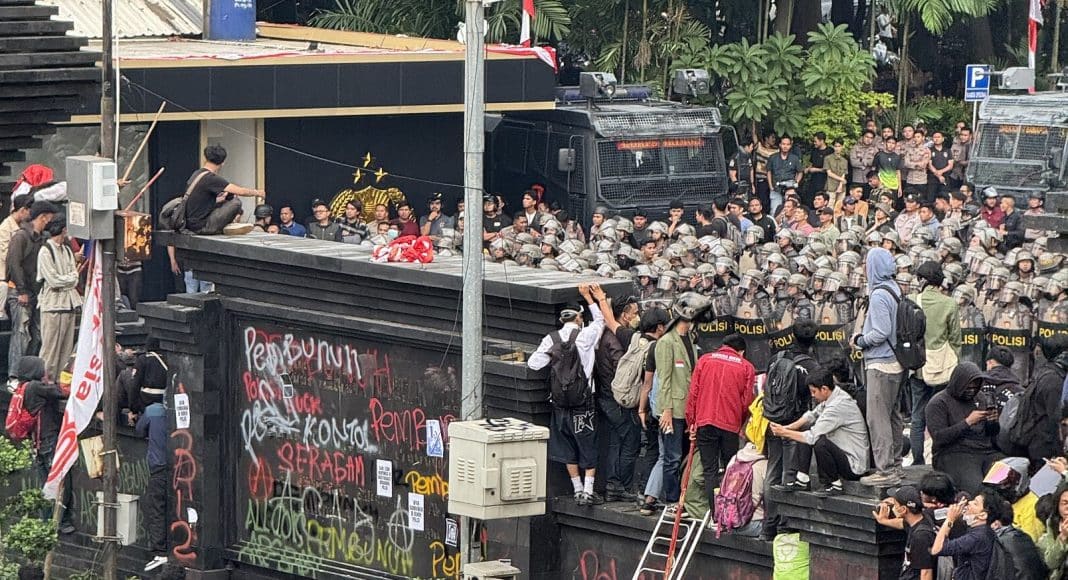On 25 August 2025 students, activists, and workers protested outside the parliament building in Jakarta. They had gathered to speak out against the lavish monthly housing allowance given to MPs, amounting to 50 million rupiah, more than ten times the national minimum wage, and more than 20 times the wage of the poorest areas. The protests quickly spread to other provinces of Indonesia. A rising discontent bubbled out into the streets, not just against the housing allowance, but all aspects of the ballooning cost of living. On 28 August thousands of demonstrators clashed with riot police in Jakarta outside government buildings, demanding: end outsourcing, raise minimum wages, halt mass layoffs, and reform labour taxes. They were met with uncompromising police violence in the form of tear gas, water cannons, and rubber bullets. A video emerged online of a militarised armoured police vehicle speeding through a crowd of protesters and brutally running down 21-year-old Affan Kurniawan, a motorcycle taxi driver who wasn’t even involved in the unrest. The vehicle stops briefly before continuing, running over Kurniawan once again. The young man was taken to hospital but died soon after. His death sparked a furious reaction from the broader community and intensified the protests.
The crushing hand of austerity
If Kurniawan’s death was the spark, then the fuel has been decades of crushing austerity imposed upon the workers. In Indonesia and other countries ravaged by imperialism, large portions of the state budget are garnished to service debt payments to institutions such as the International Monetary Fund (IMF) and the World Bank (WB). These are tools of capitalist domination that predatorily lend money to desperate countries with the full knowledge that the debt will never be escaped. They use this as leverage to dictate policy, forcing governments to privatise public services, undergo deregulation, increase taxes, mandate austerity and open the country up to foreign capital. In February, President Prabowo Subianto announced his dubious ambition to attract foreign investment with a staggering $44bn ‘sovereign wealth fund’ by slashing state budgets, including from his previously promised free school meals programme and infrastructure projects.
Anti-communist slaughter
The current events in Indonesia are an echo of the violent repression and imperialist domination that taints its history. During the second world war, the Netherlands declared war on Japan following Pearl Harbour, prompting Japan to invade the Dutch East Indies which would later become Indonesia. This advanced the political career of Sukarno who was a leading figure in Indonesian nationalism. He was a prominent voice in the anti-imperialist Non-Aligned Movement, which was a grouping of 121 countries that were not formally aligned with the capitalist or communist bloc. After Japan’s surrender in August 1945, Sukarno and other nationalists grabbed their chance to declare independence, rather than fall back into colonial rule under the Dutch. Sukarno led the resistance in the Indonesian National Revolution, a four-year struggle against over 200,000 troops sent by the Dutch, as well as troops from the Royal Navy. In 1949, pushed by the US, the Netherlands transferred sovereignty to the newly proclaimed United States of Indonesia, led by its first democratically elected president, Sukarno. Sukarno would go on to precariously balance three major pillars: political Islam, the military and the Indonesian Communist Party (PKI).
However, foreign meddling was not finished in this region as the US enacted covert CIA operations to thwart communism alongside their efforts in Vietnam. Indonesia boasted the third largest communist party in the world, behind only the USSR and People’s Republic of China. In 1958, a rebellion was fomented by the CIA with the goal of overthrowing President Sukarno using dissident military commanders that ultimately failed. In 1965, six army generals were assassinated and a supposed coup attempt was declared. A military general, Suharto, quickly instructed special forces to seize several strategic sites. He broadcast a message on the radio that claimed that the PKI was behind the coup attempt, and that he would crush the movement with control of the army. Suharto used this opportunity to purge the country of communists and other leftist organisations. Known and suspected communists, trade unionists and some ethnic groups were slaughtered. Some estimates put the number of killings between 2-3,000,000.
Suharto carried out this unspeakable violence with the direct involvement of the US and Britain. The US provided extensive support in the form of financial and military aid, as well as providing lists of suspected communists to generals. In declassified documents, it was revealed that British propagandists incited anti-communist sentiment. Pamphlets were spread around in Indonesia calling for ‘the PKI and all communist organisations to be eliminated’. They instructed people to ‘cut this communist cancer out of the body of the state’. Suharto reigned from 1967 until 1998, maintaining an iron grip while embezzling up to $35bn. He enacted pro-imperialist policies throughout his reign. Suharto was dislodged in 1998 in the face of riots and unrest, after being pushed by the IMF to remove subsidies on fuel and food which increased their costs by 70% in the 1997 Asian financial crisis. To this day, communism is still banned in Indonesia.
In response to the 2025 uprising, Prabowo has attempted to quell the anger by rescinding the housing allowance, firing a police officer involved in the killing of Affan Kurniawan and reshuffling cabinet ministers. Subsequent rioting in the following weeks has seen the deaths of ten people. Police compounds and other buildings have been set alight by angry citizens. Police violence and crackdown on dissent have intensified, as despite his minor concessions, Prabowo has remained unyielding, calling the unrest ‘leaning towards treason and terrorism’. Only the strength of a united people can destroy the exploitative system of capitalism and build a better world for everyone. We must support the workers of Indonesia in their fight against the lackeys of imperialism.
Glen Hartill
FRFI 308 October/November 2025




